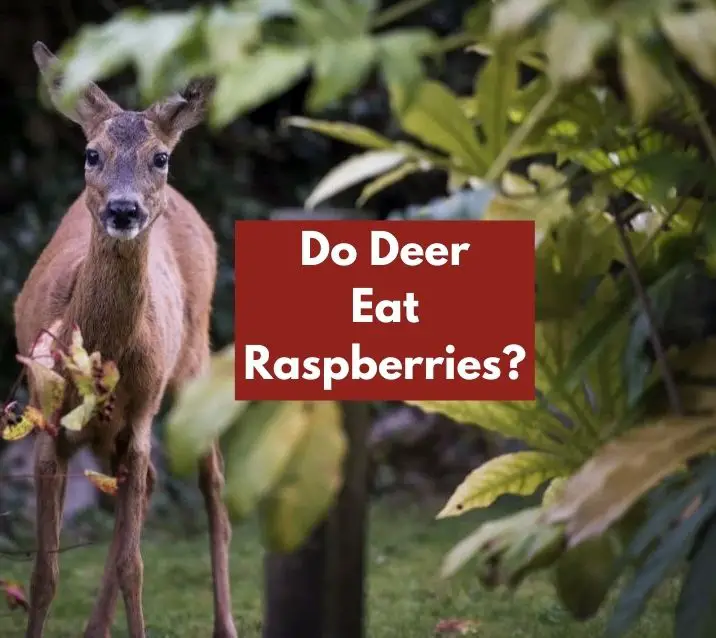There are a lot of myths out there about what deer do and do not eat, especially when it comes to common flowers and plants. One common question is: do deer eat raspberries?
The answer is yes – deer love to eat raspberries throughout the year. Deer are attracted to raspberries because of their sweet taste and nutrition they provide.
Considering that a single deer can eat up to ten pounds of plants each day, you can see how deer eating raspberry bushes can really do some serious damage to these plants!
Why Do Deer Eat Raspberries?
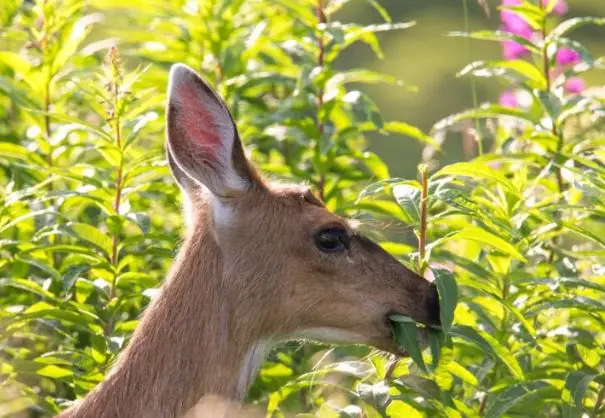
As we covered, deer will eat every part of raspberry bushes (berries, shoots, leaves, flowers, and stems) whenever they can.
But why do they do this?
Deer like sweet foods and plants that are well-watered and fertilized, and raspberries check every box.
Deer can do some serious damage to a large amount of raspberry plants in a single sitting if they’re hungry enough!
This was confirmed in a 1999 study on deer plant eating habits by Cornell University.
Plants like Raspberries contain water, sugar, protein, and nutrients, which makes them an ideal food source for deer.
And don’t think that newer raspberry bushes are safe either: deer actually prefer new growth because they’re more tender and the thorns aren’t as hard.
Additionally, deer will consume a wide variety of foods like raspberries based on opportunity.
They’re planted in the ground and grow easily in many areas, so they’re easy for deer to access.
In fact, raspberry bushes are increasing in popularity for hunters who want a deer food plot but don’t have access to farming equipment.
This is because raspberries are relatively easy to grow and attract deer so well.
Check out this video of a deer eating raspberries right out of a backyard garden:
If you’re not convinced, leave some raspberries out or plant some, and wait to see what happens!
Are Raspberries Deer Resistant?
No, raspberry bushes are not deer resistant.
In fact, deer are attracted to raspberry bushes because of the tender shoots and sweet fruit they bear.
What Kinds Of Raspberries Do Deer Eat?
We’ll have homeowners ask: do deer eat raspberry plants, raspberry bushes, or another specific type they have on their property.
The short answer is, yes, deer will eat all types of raspberries including summer bearing and everbearing raspberries.
Deer love all types of raspberries, including Boyne, Cascade Delight, Killarney, Raspberry Shortcake, Royalty, Anne, Dorman Red, Fall Gold, Heritage, Jewel, Joan J, Polka, and September raspberries.
How Do I Keep Deer From Eating My Raspberries?
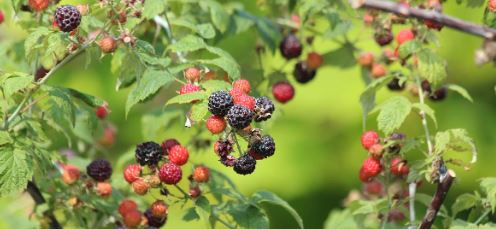
Some farmers and hunters encourage deer to browse their raspberry bushes as part of food plots or other attractants.
If you’re in the other camp and want to protect your raspberries from deer, we’ve got some great options for you.
There are a few things to keep in mind when you’re protecting raspberries from hungry deer: their habits, your scent, repellent options, and when you plant them.
Deer will eat nearly anything if they’re hungry enough, so your main goal is making your garden as least inviting to deer as possible.
Check out our guide on how to keep deer from eating plants where we cover 25 quick and easy tips for keeping hungry deer out of your garden.
Will Raspberries Grow Back After Deer Eat Them?
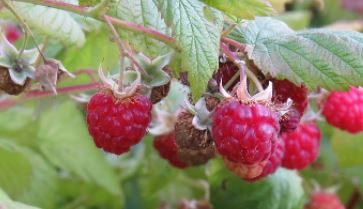
Fortunately, raspberries are rather hardy, since they have a strong root system that is mostly underground.
If a deer attacks your raspberry bush, just wait it out – the raspberry bush will keep growing, although you aren’t going to see the plant bear much fruit following damage from deer in the same year.
Continue to water and fertilize the raspberry bush until it’s back to good health, and plan to harvest the following year.
Are Raspberries Good For Deer?
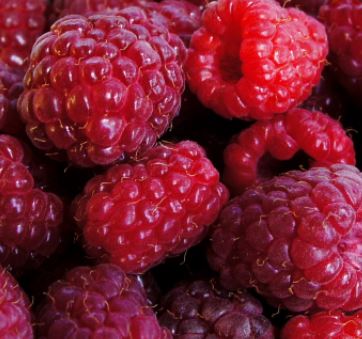
Raspberries contain highly digestible fiber and a good bit of carbs, so it attracts deer easily.
In addition to being a great source of energy, deer eating raspberries provides them with the following vitamins and minerals:
- Vitamins A, C, and K
- Folate
- Calcium
- Iron
- Magnesium
- Phosphorous
- Potassium
- Zinc
- Manganese
These vitamins and minerals provide deer with many benefits.
For example, vitamin C will help protect deer against scurvy and vitamin assists in deer immune system function.
Deer need calcium for bone, teeth, and antler growth and health as well as other bodily functions like milk production and metabolism.
Potassium is great for deer because it helps maintain good pH balance and aid in proper digestion.
Magnesium is great for antler growth, increasing body weight, and has immune system benefits for deer.
Manganese assists deer in growth, respiration, and reproduction.
A 2007 study showed that zinc can assist in growing larger antler sizes in white-tailed deer.
Phosphorus also aids deer in body and antler growth.
Fat-Soluble Vitamins in Raspberries For Deer
Vitamins A, D, E, K, and calcium are fat-soluble, so they can be stored in the deer’s fat and liver to be used later as needed.
This means that calcium content from deer eating raspberries can be “stored up” for later use, which is highly beneficial.
Water-Soluble Vitamins In Raspberries For Deer
Vitamin C, B Vitamins, niacin, folic acid, and potassium are all water-soluble, which means they cannot be stored, so they must be replaced continually.
So a deer that eats raspberries for the vitamin C content must continue to consume foods that contain these necessary vitamins to stay healthy.
Do Deer Eat Raspberries? Wrapping Things Up
So, do deer eat raspberries?
The answer is yes!
Deer will eat raspberries whenever they can, especially when the plants are young because the plants are the most tender.
Once a raspberry bush is mature, deer will still eat the berries and leaves from them ravenously.
Have any observations to add to the discussion? Be sure to let us know in the comments below.
Check our our other helpful wildlife guides while you’re here:
- Can deer eat orange peels?
- Do deer eat corn on the cob?
- Do deer eat pumpkins?
- Do deer eat blackberries?
- Do deer eat carrots?
- Do deer eat strawberries?
- Do deer eat elderberry?
- Do deer eat pineapple?
- Do deer eat kiwi?
- Can deer eat lemons?
- Do deer eat cherries?
- Do deer eat apricots?
- Do deer eat nectarines?
- Do deer eat peaches?
- Do deer eat blueberries?

